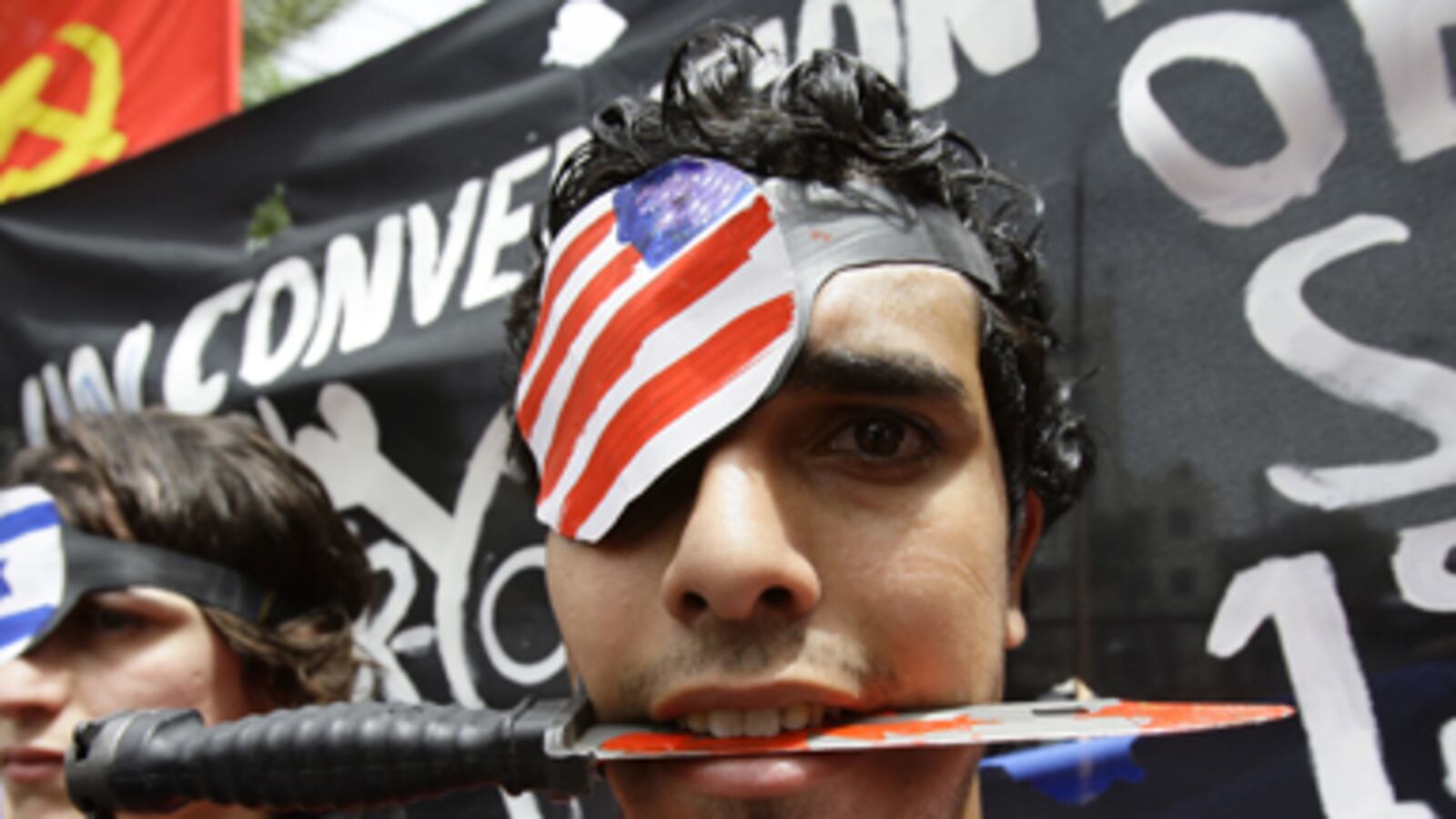In the wake of Judge Richard Goldstone’s landmark op-ed in The Washington Post, Stuart Robinowitz says Human Rights Watch should issue a mea culpa for its allegations that Israel committed war crimes in the deaths of civilians in Gaza—and return to the nonpartisan humanitarian goals for which it was created. In a rebuttal, HRW’s Iain Levine writes that Goldstone, far from “retracting” his entire report on the Gaza war, “only reconsidered the report’s conclusion that Israel had a policy of deliberately targeting civilians in Gaza—a charge Human Rights Watch never made.” See Levine’s full response here.
What does it take to get Human Rights Watch to mitigate its hostility to Israel? A fair-minded person would have expected an admission of error, even an apology, following the landmark retraction by Judge Richard Goldstone of his 2009 report to the United Nations accusing Israel of war crimes.

After reviewing the results of intensive Israeli investigations into the deaths of civilians in Gaza in the winter of 2008-09, Judge Goldstone wrote in The Washington Post, “if I had known then what I know now, the Goldstone Report would have been different.” He wrote that he would not have made allegations of “intentionality” because there is no evidence that Gaza civilians were “intentionally targeted as a matter of policy.”
Human Rights Watch (HRW) had made much of its charges that Israel deliberately targeted civilians before last week’s retraction by Judge Goldstone. Yet Executive Director Kenneth Roth cannot bring himself to acknowledge the significance of the judge’s recantation. In The Guardian, he writes that the Goldstone report “will live on.”
How can a false report live on? The Arab News, hardly a defender of Israel, bemoans Judge Goldstone’s retraction of intentionality because it “vindicates” and “exonerates” Israel.
Not to Roth and HRW. The headline on his article in The Guardian fairly represents his point of view: “Gaza: The Stain Remains on Israel.” But in HRW’s summary report on Gaza of April 2010, the organization agreed that the laws of war require proof of “criminal intent.” Now that proof of criminal intent is shown not to exist, all of HRW’s charges of war crimes are undermined. For there can be no war crime without criminal intent.
HRW’s Middle East reports support the campaign of Iran and its allies to demonize Israel.
Those who have followed persistent attempts by HRW to delegitimize Israel will not be surprised by Roth’s inconsistent statements. HRW’s refusal to renounce its original war-crime allegations is very much part of a disquieting game of musical chairs the organization has been playing recently. It is proposing to replace its founder and longtime chairman, Robert Bernstein, on the advisory committee of its Middle East and North Africa division while appointing an alleged Palestinian terrorist, Shawan Jabarin, to the same committee.
Bernstein incurred HRW’s wrath in October 2009 by writing an op-ed in The New York Times, now vindicated, criticizing HRW’s reports on Gaza. He further angered HRW by openly criticizing the appointment of Jabarin, noting that the Israeli supreme court called him a terrorist on three occasions (2007, 2008, 2009), describing him as “a Dr. Jekyll and Mr. Hyde, in part of his hours of activity he is the director of a human-rights organization, and in another part he is an activist in a terrorist organization that does not shy away from acts of murder.” Jordanian and Israeli security services, acting independently, reached the same conclusion in 2005 and 2006.
Jabarin’s appointment is not the only recent embarrassment for HRW. Sarah Leah Whitson, MENA’s executive director, wrote a favorable article about Muammar Gaddafi’s son Saif, calling him a human-rights reformer, in a 2009 article in Foreign Policy under the headline “Tripoli Spring.” Despite Libya’s abysmal human-rights record, HRW issued only one critical report about it in 2010, while releasing 10 reports about the U.S. As we have since learned, the “Tripoli Spring” didn’t last long. Saif is now the subject of a war-crime investigation by the International Criminal Court for slaughtering protesters.
Other controversial favorites at HRW include Normal Finkelstein, a political activist who compares Israel to Nazi Germany. In an interview with The New Republic, MENA’s Whitson said, “I continue to have tremendous respect and admiration for him because, as you probably know making Israeli abuses the focus of one’s life work is a thankless but courageous task.”
In 2009, HRW sent a mission to Saudi Arabia, a serial human-rights violator, to solicit contributions from the ruling elite to counter what it called “pro-Israel pressure groups” in the U.S. In response to criticism, Roth said the purpose of the trip was to solicit money from victims of repression.
HRW was a leading participant in the 2001 Durban I conference—which accused Israel of “genocide” and “ethnic cleansing”—and declared that the conference ended on a “hopeful note.” By contrast, the U.S. and other democracies walked out. HRW also participated in the 2009 Durban II conference featuring Iranian President Mahmoud Ahmadinejad as the keynote speaker and neither objected to his appearance nor condemned what the White House called his “hateful rhetoric.”
HRW’s reports on the Middle East portray Israel as one of the world’s worst violators of human rights, comparing it to the repressive dictatorships of North Korea and Burma. In recent years HRW has issued more reports criticizing Israel than Iran, Libya, Syria, Egypt, Tunisia, Yemen, Algeria, or Morocco.
HRW issued five reports about the Gaza conflict, one against Hamas (30 pages) and four against Israel (almost 300 pages). But after Judge Goldstone and Roth’s present acknowledgement that there was no criminal intent, those reports are fatally flawed. HRW’s war-crime allegations also were rejected by U.S. officials and leading independent military experts, including Anthony Cordesman of the Center for Strategic and International Studies and Colonel Richard Kemp, the former British commander in Afghanistan. Indeed, HRW’s own former military consultant, Marc Garlasco, questioned its war-crime narrative, and he resigned under pressure and was placed under a gag order.
In addition to alleging war crimes against Israel even after Judge Goldstone’s retraction, HRW refuses to condemn Ahmadinejad’s threats to “wipe Israel off the map,” even though the U.N. Genocide Convention specifically outlaws such “incitement to genocide.” Roth sidesteps the issue by arguing that Ahmadinejad’s words may have been poorly translated from Farsi (“there is a real question as to whether he actually said that”), though those words appear on Ahmadinejad’s English-language website. The Iranian president has repeated those genocidal threats many times. Last year he said Jews are “the filthiest and greatest criminals who only appear to be human” and “have no right to exist.” Ahmadinejad’s incitement to genocide must be taken seriously, as Iran has stockpiled more than 40,000 long-range rockets in Lebanon, is on the verge of developing nuclear weapons, and recently sent warships through the Suez Canal for the first time in 30 years.
HRW’s Middle East reports support the campaign of Iran and its allies to demonize Israel. That further polarizes the parties in the Middle East, creating a poisonous atmosphere inhospitable to peacemaking negotiations. President Obama, Tony Blair, and a group of European elder statesmen including Václav Havel and political columnists including Tom Friedman and George Will have all recently warned about the danger of efforts to delegitimize Israel.
The policies of Benjamin Netanyahu’s right-wing coalition on settlements and the occupation have attracted worldwide criticism. As a supporter of the J Street lobby, I agree with that criticism. But that does not justify HRW’s refusal to condemn Iran’s genocidal threats or its incessant and false charges of war crimes. In light of HRW’s powerful influence on the press, the academic community, state actors, and the U.N., and in view of its support by the public (tax-exempt dollars), it has a duty to be impartial, nonpolitical, accountable, and transparent.
HRW has done much valuable work in defending democracy activists in the Middle East region now in turmoil. Instead of turning a blind eye to persistent genocide threats or making false war-crime claims, it should return to the nonpartisan humanitarian goals for which it was created. And it should follow Judge Goldstone’s example and publish its own mea culpa.
Clarification: A previous version of Stuart Robinowitz's bio incorrectly identified him as a former member of the Human Rights Watch board of directors. He was on the advisory committee of Helsinki Watch, which joined several other organizations to become Human Rights Watch in 1989.
Stuart Robinowitz is a retired partner and of counsel to Paul, Weiss, Rifkind, Wharton & Garrison LLP, and was formerly an adjunct faculty member at the Yale Law School and the New York University Law School. He led human rights fact-finding missions for HRW and the American Bar Association.





